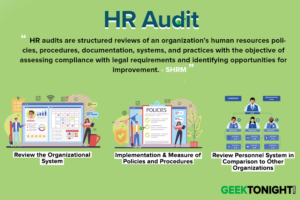Ethics in Performance Management
The ethical behaviour of an organization is a key essential for doing business in today’s competitive market. This type of behaviour plays an important role in the organization’s overall success and in this regard, an ethics professor Brenner (1992) observed, ‘A corporate ethics programme is made up of values, policies, and activities which impact the propriety of organization behaviour.’
Table of Content
The organizations are defining a comprehensive ethics and compliance program which includes six components:
- Written standards of ethical workplace conduct
- Means for an employee to anonymously report violations of ethics standards
- Orientation or training on ethical workplace conduct
- A specific office, telephone line, e-mail address or website where employees can get advice about ethics related issues
- Evaluation of ethical conduct as part of regular performance appraisals
- Disciplinary action against employees who commit ethics violations
What is Ethics?
According to Dave Kinnear, Ethics may be defined as a process whereby we choose between competing moral and/or economic values.
Concept of Ethics
For defining ethics, it is a system or code of moral standards of a particular person, group or profession. It may be defined as the actions an individual take on himself to ensure his continued survival across the dynamics.
Ethics deals with whether to perform certain kinds of action or not in line with what is acceptable to the society as a whole and therefore, ethics is the process of deciding as to what is good for human beings and also of rational thinking aimed at establishing ‘what values to hold and when to hold them’?
Principles of Ethics in Performance Management
The key principles of ethical performance management are as follows:
- An ethical performance management system directs its employees to respect the core values of the organization. Because the ethics practiced by the organization is in conjunction with its environment. On the other side, the organization respects its employees and provide good working environment so that they will generate the result as per the potential.
- This system is designed to make transparency in its operation and all the parties involved in performance management system respect each other’s needs, values, and preoccupations.
- It emphasizes individual responsibility for personal decision making, behaviour, and action rather than collective responsibility.
- This system put emphasis on employees respecting and actively considering the ethical concerns and issues of all stakeholders, rather than focusing merely on shareholders alone.
- This seeks to build or change culture to a state in which the vision of the organization includes its employees, its customers, and the society at large.The values and norms of organization support employee’s decision making, behaviour, andactions consistent with an ‘ethical’ vision.
- This system provide fair and free environment to itsemployees so that employees can get the opportunity to scrutinize the basis upon which the important decisions were made.
Ethical Issues and Dilemmas
Rushworth Kidder (1995) said that “An ethical dilemma is not a choice between right and wrong, but a choice between two rights.”
In organizations, many managers talk about ethics but do not recognize or act upon ethical issues in their day-to-day managerial responsibilities and most ethical questions arise from people relationships within the organizational settings. There are recent survey results in which one large organization indicate that only 26% of managers believe they are recognized and reinforced for their ethical decisions and behaviours.
Performance management is essentially a commitment-based system of the organization. This seeks to align employee action and behaviour towards the desired organizational goals. As employees are the key to the organization, their beliefs, values, behaviours, and actions have a profound impact on the organization’s outcomes and most organizations understand that employees tend to engage in behaviour that is recognized and rewarded, and avoid behaviour that is penalized.
For example: In ABC Ltd. performance-based reward system exists where one of the employees has done an outstanding job all year, so he deserves strong recognition. However, he is already paid at the top of the salary range for his job grade. Due to this reason, ABC Ltd. has too many people in the grade above him, so the company cannot promote him.
Likewise, some of the ethical issues and dilemmas are listed below:
- Performance Appraisal
- Value Conflict
- Workplace Politics
- Employee Engagement
- Taking Unnecessary Credit
- Illegal and Unethical Practices
- Multiple Loyalties
Performance Appraisal
Performance appraisal lends itself to ethical issues as assessment of an individual’s performance is based on observations and judgement and the HR managers are expected to observe the performance in order to judge its effectiveness.
The managers tend to rate those employees high whom they consider to be their loyalists and they inflate their performance ratings and reward them for the performance they have never exhibited, or perhaps could never deliver. In such situations, these types of managerial unethical behaviours and actions have a detrimental effect on the rest of the employees including performers.
Value Conflict
Every organization has its own set of core values and they expect that its employees should honour and practice these values. On the other hand, if we are considering the employees, they also have their own set of values and goals and they want to follow their own value rather than the organization’s values.
Workplace Politics
Workplace politics is the major concern in these days and according to a survey it is estimated that 18 per cent of an administrator’s time is spent resolving conflicts among employees. This type of situation also states that use of such intentional behaviour is designed to acquire power or to protect their self-interest.
Employee Engagement
It has been seen that many talented employees’ shows dis-interest to their jobs and they tried to maintain the minimum level of performance to hold on to their jobs. In most of the situation it has been observed that they spent their precious time on other unnecessary activities.
For example: Employees using their organization’s internet access for personal purposes during work hours and it results in productivity losses.
Taking Unnecessary Credit
In a practical sense, there are many managers who show their employees work as their own and they take unnecessary credit of their employees to work. These managers are either incompetent or dislike to work, and manipulate their subordinate’s good work as their own and these kinds of issues adversely impact the performance of employees.
Illegal and Unethical Practices
There are different kinds of activities include feudal treatment given to employees, bribery, backstabbing, office politics, etc. and all these activities affect the outcome of performance management. There is a survey of Ernst and Young, India which maintains comparatively higher fraud levels at 42 per cent with the global level of 27 per cent.
Such unethical managerial behaviour has a devastating impact on the morale, motivation, commitment, and performance of employees which is not good for organizational health.
Multiple Loyalties
Loyalty is an ethical value and many people feel an obligation to promote the interests of special groups or friends. However, the primary loyalty is to the code of ethics and the public good and these obligations can become unethical when it extends to making sure that a special group or individual benefits at the expense of other groups.
Developing Code of Ethics
The key guidelines to maintain an ethical performance management system in the organization are given below:
- HR Responsibility
- Developing Standards
- Ethical Leadership
- Fairness and Justice
- Conflict Management
- Transferring Information
HR Responsibility
In organizations, the HR professionals are responsible for adding value to by developing HR functions. They are also responsible for maintaining the balance between performance improvement and ethical behaviour in the organization.
The HR professionals shall act as ethics custodians and train and develop human resources for dealing effectively with relationship issues of morality, integrity, and honesty with other stakeholders particularly customer, suppliers, and society at large.
Developing Standards
Human resource professionals must strive to meet the highest standards of competence and ethics. The purpose is to keep abreast of organizational strategy, mission, and objectives on a continuous and consistent basis.
They must drive ethics training of top managers and employees on a wide scale. They have to educate them on the significance of ethics in attaining high-performance standards. The HR professionals shall transmit ethics to employees, managers, and external stakeholders through performance management system.
Ethical Leadership
In making performance management a truly business-aligned, transparent, and credible management endeavor, human resource professionals must exhibit individual leadership. They should act as ethics communicator to improve the situation for their organizations.
Fairness and Justice
For employee’s work achievements and their contribution in improving organizational competence and performance, there should be fairness and justice in respect of rewards and recognitions.
Human resource professionals are ethically responsible for promoting fairness and justice in the organization and they must enable a culture where ethical behaviour and action is a key performance criterion.
Conflict Management
They must safeguard the interest of all stakeholders to eliminate the conflict arising between manager-employees, employer-employee and employees-organization on certain issues related to rewards and recognition etc.
Transferring Information
The human resource professionals should ensure truthfulness of communication. It should be in respect of performance feedback and counselling and help top leadership in taking informed personnel decision.
Human Resources Tutorial
(Click on Topic to Read)
Human Resource Management
- What is Motivation?
- Performance Appraisal
- Performance Appraisal Process
- Performance Appraisal Problems
- Management by Objectives
- 360 Degree Performance Appraisal
- What is Compensation?
- Employee Discipline
- What is Employee Grievance?
- What is Collective Bargaining?
- What is HRIS?
- Competency Based Training
Human Resources Tutorial
(Click on Topic to Read)








